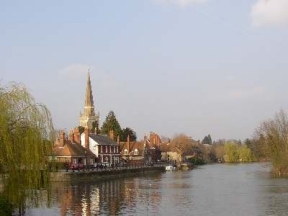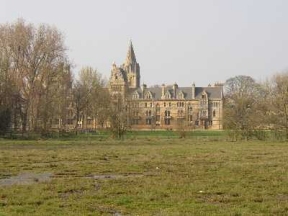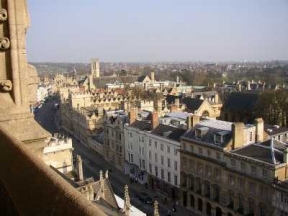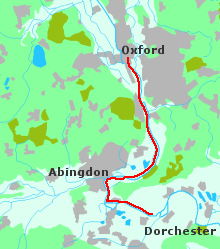That night I slept deeply on a bed of soft grass. After four long days I was tired enough. I awoke at six and peered out from under the dripping canopy. The storm had passed, leaving a sombre-looking morning. Grey clouds floated over the river, and there was a cold breeze. I might have been inclined to stay in the warmth of my sleeping bag; but I realized that, where I was, I was extremely visible. I packed as quickly as possible and waded through the long grass down to the towpath. My trousers were soaked to the knee as I reached it. Wet and chilly, it was an inauspicious start to the day.

I remember little of that morning. Perhaps there was little to remember; it happens that way sometimes. I passed Abingdon with its narrow streets running down to the river, and for the first time began to think of Oxford and the end of the road. The path became somehow less rural, though it still went its way through the water meadows. There were glimpses of buildings through the trees, and a hum of traffic in the air. A concrete flyover yawned cavernously over the stream, bearing the ring road that circles the city. I stopped for a pint at a riverside pub: it was Eights Week and the university crews were out on the water. The Thames here is not wide enough for racing side by side, so the boats start at intervals, each trying to catch the one in front while avoiding the pursuing crew. As I came out of the pub the starter released an enthusiastic bunch. They swung away from the line in great style, heading for the first bend. I watched fascinated as the cox, who did not appear to be as experienced as his colleagues, guided the boat unerringly towards an overhanging willow. The frail hull flexed visibly as it stuck the trunk with a booming crash that must have been heard a quarter of a mile away. Incredibly it did not shatter, and the crew too seemed none the worse for the impact. The following boat glided serenely past as they sorted themselves out, no doubt enjoying the easiest win they were likely to have that day.

Oxford came quickly. I walked among students cycling the towpath in pursuit of their college crews. I passed the university boathouses on the far shore, where the egg-shell craft were launching from concrete slipways. Over the water I glimpsed the great mass of Christ Church, frowning down upon its wide meadow. And then, suddenly, I arrived at Folly Bridge and plunged into the heart of the city. I had been four nights and five days alone in the countryside, and the noise and bustle of St. Aldate's took me aback. The end was so abrupt that I sought refuge in a pub, where I could sit by myself and get used to the idea.

I found a quiet corner at the Turf Tavern. After long days of walking it seemed odd not to move, to be still and wait for a train to take me home. I looked back on the trip, trying to find some kind of perspective, but thoughts and memories were hopelessly jumbled. I was not even sure if I was glad it was over. There were certainly things that I would not miss. I was looking forward to a hot bath, and clean clothes, and a soft bed. Others, though, I felt I should regret. The days seem to pass so quickly at home, and their ending leaves just a few grey impressions. But when you travel under the wide sky, alone with your thoughts, you experience in a different way. You have time to notice things. There are no clocks to order the passing hours, to tell you to eat or sleep or enjoy. There are no hours. Time just happens.
A part of me wanted to go on, and see further, but I turned back. The journey was done, and I had work to do. And so it was that I walked slowly down to the station, and caught the train, and came home.

